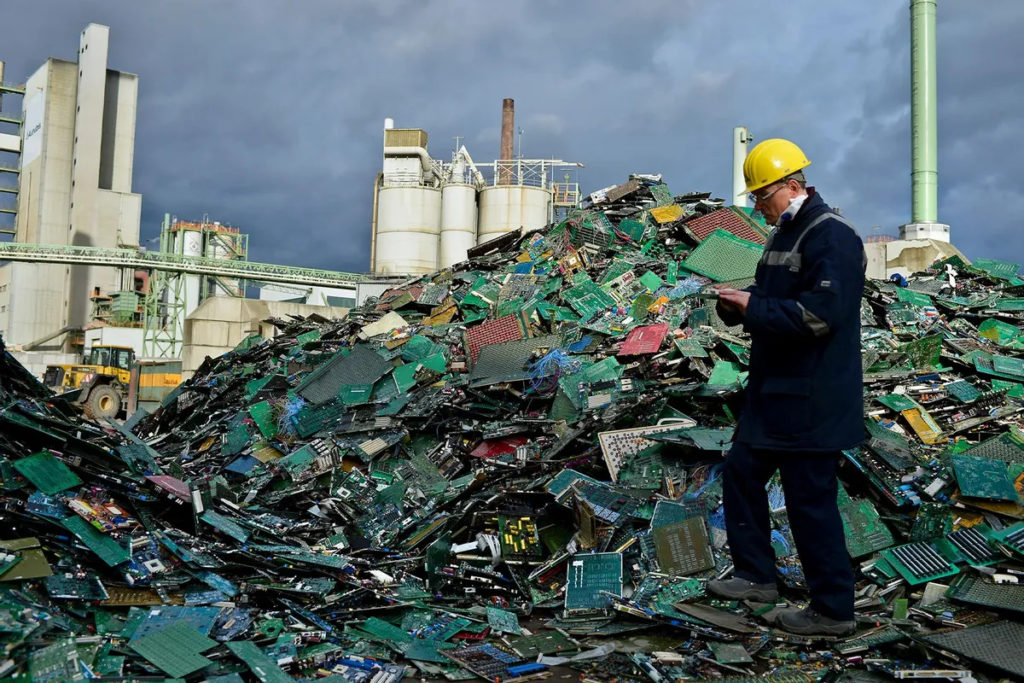Original publication by Eric Schank for salon.com on 11 May 2022
We’re leaving the fossil fuel era and entering an “age of metals” — and that may mean sifting through our trash

(Getty Images/Tanaban chuenchay)
Some metals, like nickel and lithium, are household names; indeed, advertisements for batteries play on the exotic sound of “lithium-ion” as though it were a novelty, despite lithium’s ubiquity in electric cars and gadgets. Yet the true drivers of the digital economy are the rare earth metals, without which modern electronic devices would not work. Once virtually unknown outside of geochemistry research, these metals, which include neodymium and praseodymium, as constituents of powerful magnets used in hard drives and computer speakers.
Rare earth elements are so named because they are uncommon on Earth; yet these metals, which comprise an entire row of the periodic table and then some, are clearly crucial to the modern economy. Unfortunately, the rarity of the rare earths extends beyond their dearth in the Earth’s crust. Recently, they’ve become rarer in human supply chains, as evidenced by recent price spikes: the price of neodymium surged 75% between January 2020 to December 2020, and terbium doubled in price, according to a Physics Today report from 2021.
To the United States, control over these resources is a matter of market stability. Russian dominance over nickel and a power grab for a Ukrainian lithium reserve exacerbated existing supply chain shortages.
Hence, the scramble for rare earth elements has prompted an intriguing proposal from the influential Royal Society of Chemistry (RSC). The United Kingdom–based learned society with over 50,000 members recently proposed that rather than mining for increasingly scarce raw materials in the ground, perhaps it is time humans rummaged through junk drawers — or landfills — to feed consumer demand.
“Developing a circular economy where minerals used in tech devices are salvaged and repurposed could help us to bypass supply chain issues in the future while also helping to reduce environmental impacts,” Professor Tom Welton, President of the RSC, stated. “It is essential that governments and businesses urgently do more to develop a circular economy which can tackle the world’s growing e-waste crisis and alleviate the strain on supply chains.”
The idea — of “mining” e-waste, as it were, for already-processed and refined minerals — is both an economic as well as an environmental proposal. The mining of rare earth elements is tremendously environmentally taxing, and produces foul waste: radioactive thorium tends to accumulate in the same ore as rare earth elements, and the toxic element is a byproduct that is difficult and dangerous to handle. Likewise, for reasons that date back to the formation of the solar system, rare earth elements tend to be found together, and are very resource-intensive to separate in refining, which generates more pollution.
Meanwhile, a vast, untapped stockpile of e-waste continues to accumulate dust in homes around the world — which has components with pre-refined rare earth metals that can be pried out, without any refining or thorium pollution as a byproduct. Hence, to the RSC, whether damaged or obsolescent, haphazardly hoarded devices represent a potentially massive boon for the green economy.
Rolling out results from a new survey about consumer attitudes on rare earth elements, the RSC noted that “the device you’re reading this on contains at least 30 different naturally-occurring elements” in a graphic on Twitter. Following the original statement, the same graphic asked, “do you know its environmental impacts?”
Professor Welton advocated for a more dedicated infrastructure for recycling such metals.
“Not only do we need governments to overhaul recycling infrastructure and tech businesses to invest in more sustainable manufacturing practices, we need greater public and private investment in research to enable chemical scientists like those at N2S to progress methods of separating critical raw materials from electronic waste for recycling purposes,” Professor Welton advocated.
Most Americans and indeed most people worry about environmental impacts of e-waste and want the government to do more to address the issue, the RSC found. To the average consumer, who actively seeks sustainable products, it is not worth a higher price, believing manufacturers should bear responsibility for recycling. Yet, waste management solutions lag.
Giving a more sobering perspective on the matter, Professor Michael Bau, a geophysicist with the Jacobs University research group Critical Metals for Enabling Technologies, offered a balanced perspective on the gravity of the situation. Curtailing damaging mining operations and finding better remediation techniques are necessary, he explained, but e-waste recycling remains 20% efficient worldwide.
“We may leave the age of fossil fuels — we may get out of oil and gas and coal, but what we will do is reenter an age of metals. It’s just that these metals are very different from those that we needed in the past.”
“Sustainable mining is a dream,” he explained. “We exploit the resource, let’s face it. We exploit the planet, and that has all sorts of negative results for the planet and for all the organisms, including us who live on the planet, but we need that to sustain our modern society.”
Marvels of the twentieth century from smartphones to MRIs would not exist without at least a handful of these rapidly disappearing resources. Moreover, some of these are essential for solar panels, wind turbines, hydrogen fuel cells, and other green technologies. Not only that but many are not even in the e-waste stream yet. Scandium, a component that would be necessary to produce hydrogen fuel cells, is in few if any consumer product waste streams.
“We may leave the age of fossil fuels,” he asserted. “We may get out of oil and gas and coal, but what we will do is reenter an age of metals. It’s just that these metals are very different from those that we needed in the past.”
Without these critical raw materials, an energy transition will not be feasible, according to Professor Bau. It would take a concerted global effort and even then recycling would need to become exponentially more efficient. Precluding a true, closed-loop, there will always be a need for continued extraction of rare earth metals within an economic system necessitating continuous growth and maintenance of current technological abilities.
“We need to actually mitigate the effects of climate change,” he added. “Of course, we have to make sure that what we do does not actually create bigger problems than the ones that we actually already have, so we have to understand how to actually find critical metals and then produce them from deposits in an environmentally friendly way, and that’s the important point. At the same time, we have to understand how these elements behave in the environment and how can we prevent that in case they are toxic, that in case we release them into the environment that in case we contaminate our rivers and lakes, our groundwater, our soils, our oceans how can we actually clean up the sites.”




